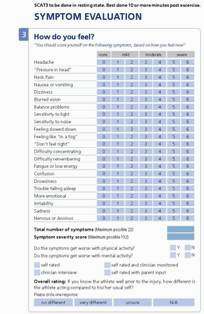Nearly a third of patients at two leading sports concussion clinics reported having previously suffered a concussion which went undiagnosed, says a new study.[1]
After being furnished a copy of the Post-Concussion Symptom Scale (PCSS),[2] a widely used symptom inventory used in the most recent international consensus statement on concussions in sport (at right), [3] the athletes were asked if they had ever sustained a blow to the head which was not diagnosed as a concussion but was followed by one or more of the signs and symptoms listed on the PCSS.
A total of 148 patients out of the 731 patients included in the study (31%) reported undiagnosed concussions by answering yes to the question.
Researchers at Boston Children's Hospital and the University of Pittsburgh Medical Center reported no significant differences in gender, mean age, or mean number of previously diagnosed concussions between participants with previously undiagnosed concussions and those without.
They found, however, that those with undiagnosed concussions were more likely to have lost consciousness (although they were unsure the difference was statistically significant) and to report higher PCSS scores with their current injury than athletes who had not been concussed before.
Athletes reporting higher total symptom scores after concussive injury are believed to be at increased risk that concussion recovery will take a month or more.[4] Failure to diagnose concussions in athletes can also lead to further damage to the brain before full recovery, exposing them to the cumulative effects of injuries and increased risk of second impact syndrome. [5-7]
The rate of previously undiagnosed concussions was slightly lower than the nearly 50% reported in some earlier studies.[8,9]
Lead study author, William P. Meehan, III, MD, Director of the Sports Concussion Clinic at Boston Children's Hospital (among his many titles), and a MomsTEAM concussion expert featured in its new PBS documentary, "The Smartest Team: Making High School Football Safer," speculated that the differences in findings could have been the result of a number of factors, including "increased education and awareness and understanding of concussion resulting from increased media attention." A number of 2013 studies, however, seem to suggest that increased education alone has been ineffective in changing concussion reporting behavior. [10-13]
Other possible explanations, posited Meehan, were differences in methodology (a more inclusive list of concussion signs and symptoms than in the previous studies reporting higher under-reporting rates) and study populations (all sports played by athletes seen in the clinics involved in the current study versus the high school football players [8] (perhaps less likely to report symptoms than athletes in other sports) and the NCAA Division 1 scholarship athletes [9] involved in the other studies.
Meehan said further studies were needed to determine the reasons behind the under-diagnosis of concussions in order "to effectively encourage those athletes to seek proper medical attention."
1. Meehan WP, Mannix RC, O'Brien MJ, Collins MW. The Prevalence of Undiagnosed Concussions in Athletes. Clin J Sports Med 2013;0:1-4 (epub ahead of print)
2. Pardini D, Stump JE, Lovell MR, Collins MW, Moritz K, Fu FH. The post-concussion symptom scale (PCSS): a factor analysis.Br. J Sports Med.2004;38:661-662.
3. McCrory P, et al. Consensus statement on concussion in sport: the 4th International Conference on Concussion in Sport held in Zurich, November 2012. Br J Sports Med 2013;47:250-258.
4. Meehan W, Mannix R, Straccioloni A, Elbin R, Collins M. Symptom Severity Predicts Prolonged Recovery after Sport-Related Concussion, But Age and Amnesia Do Not. J Pediatrics 2013:DOI 10.1016/j.jpeds.2013.03.012 (published online ahead of print April 25, 2013)
5.Guskiewicz KM, McCrea M, Marshall SW, et al. Cumulative effects associated with recurrent concussion in collegiate football players: the NCAA Concussion Study. JAMA 2003;290:2549-2555.
6. Cantu R. Second impact syndrome: a risk in any contact sport. Phys Sports Med. 1995;23:27.
7. Guskiewicz KM, Marshall SW, Bailes J, et al. Association between recurrent concussion and late-life cognitive impairment in retired professional football players. Neurosurgery. 2005;57:719 - 726.
8. McCrea M, Hammeke T, Olsen G, et. al. Unreported concussion in high school football players: implications for prevention. Clin J. Sport Med 2004;14:13-17.
9. Labotz M, Martin MR, Kimura IF, et al. A comparison of preparticipation evaluation history form and a symptom-based concussion survey in the identification of previous head injury in collegiate athletes. Clin J Sports Med. 2005;15:73-78.
10. Register-Mihalik JK, Guskiewicz KM, Valovich McLeod TC, Linnan LA, Meuller FO, Marshall SW. Knowledge, Attitude, and Concussion-Reporting Behaviors Among High School Athletes: A Preliminary Study. J Ath Tr. 2013;48(3):000-000. DOI:10.4085/1062-6050-48.3.20 (published online ahead of print)
11. Kroshus E, Daneshvar DH, Baugh CM, Nowinski CJ, Cantu RC. NCAA concussion education in ice hockey: an ineffective mandate. Br J Sports Med. 2013;doi:10.1136/bjsports-2013-092498 (epub. August 16, 2013)
12. Register-Mihalik JK, Linnan LA, Marshall SW, Valovich McLeod TC, Mueller FO, Guskiewicz KM. Using theory to understand high school aged athletes' intentions to report sport-related concussion: Implications for concussion education initiatives. Brain Injury 2013;27(7-8):878-886.
13. Chrisman SP, Quitiquit C, Rivara FP. Qualitative study of barriers to concussive symptom reporting in high school athletics. J Adolesc Health 2013;52:330-5 e3.
Posted September 16, 2013








